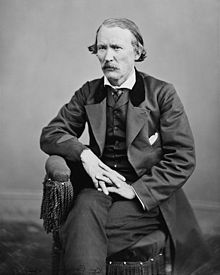
Back كيت كارسون Arabic Кит Карсън (пътешественик) Bulgarian Kit Carson Catalan Kit Carson Czech Kit Carson Welsh Kit Carson Danish Kit Carson German Κιτ Κάρσον Greek Kit Carson English Kit Carson Esperanto
Kit Carson | |
|---|---|
 Carson on a visit to Washington, DC, in early 1868 | |
| Born | December 24, 1809 |
| Died | May 23, 1868 (aged 58) Fort Lyon, Colorado |
| Resting place | Kit Carson Cemetery Taos, New Mexico |
| Nationality | American |
| Occupation(s) | Mountain man, frontiersman, guide, Indian agent, US Army officer |
| Known for | Opening the American West to European settlement Carson City, Nevada namesake |
| Spouses |
|
| Allegiance | Union |
| Service/branch | Union Army |
| Rank | Brevet Brigadier General |
| Commands held | 1st New Mexico Volunteer Cavalry Regiment |
| Battles/wars | Mexican–American War |
| Signature | |
Christopher Houston "Kit" Carson, (December 24, 1809 – May 23, 1868) was an American frontiersman, a career that involved four chief occupations: mountain man, guide, Indian agent, and officer in the US Army. He helped to open the American West to settlement. In his day, he was a celebrity known far and wide in the United States. In modern America, he is still remembered as a folk hero, but he has been criticized for killing Native Americans.
Carson began his adult life in 1829 as a mountain man, who trapped beaver about ten years for the fur trade. During those years, Carson became an "Injun killer" — he was forced to kill many Native Americans to protect himself from attacks, robbery, and murder. Carson became known as one of the greatest of "Injun killers" through novels, newspaper accounts, and other media. When the fur trade died out in the 1840s, Carson looked for other work.
In 1842, US Army Officer John Charles Frémont hired Carson to guide him on three separate expeditions into the West. All three expeditions involved mapping and describing remote and uncharted areas of the West. The expeditions were hugely successful. Frémont's reports to the government made Carson a frontier hero and were read by many Americans. Carson became a celebrity throughout the country. His adventures were turned into stories that were published in paper-covered books, called dime novels. The cheap popular books made him more famous than ever.
In 1853, Carson became an Indian agent in northern New Mexico. His job was to keep the Utes and the Apaches at peace. He saw to it that they were treated with honesty and fairness and that they got the food and clothing that they needed. In 1861, the American Civil War broke out. Carson resigned his position as Indian agent, and joined the Union Army. As a lieutenant, he led the New Mexico Volunteer Infantry. His forces fought Confederates at Valverde, New Mexico. The Confederates won the battle, but were later defeated. Most of Carson's time in the army was passed training recruits.
Carson served in several wars and battles with the tribes In the Southwest. He rounded up and moved Apaches and Navajos from their homelands to government lands called reservations. Carson was promoted to the rank of colonel. Late in life, he was promoted to brigadier general and given command of Fort Garland in Colorado. After about two years. Carson left the military because of illness. He died in 1868 at Fort Lyon, Colorado. He is buried in Taos, New Mexico, next to his third and last wife, Josefa Jaramillo.